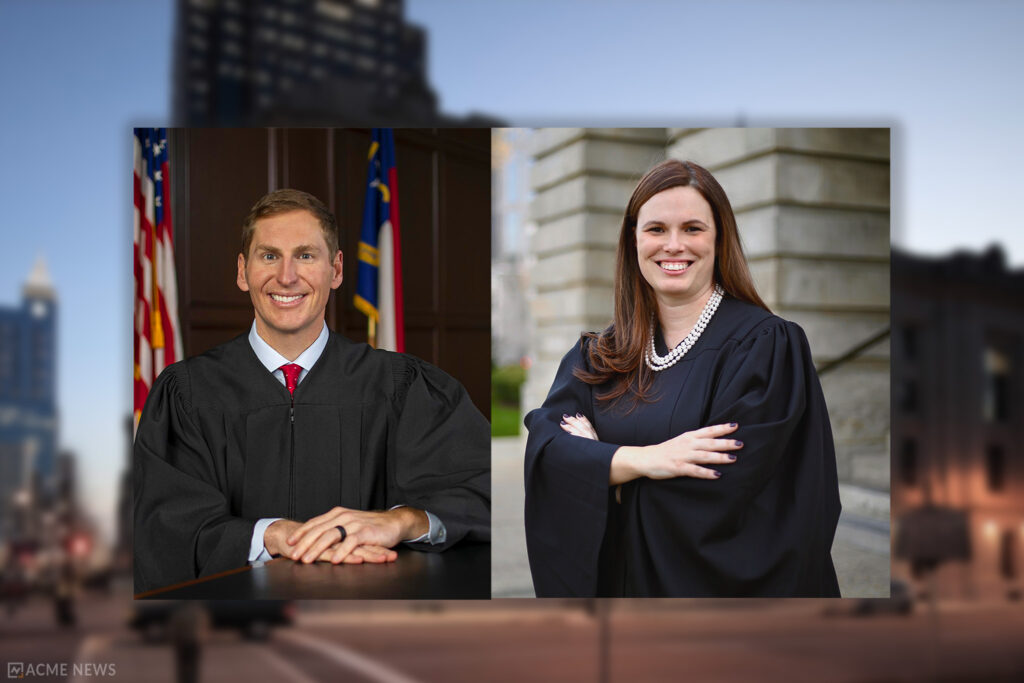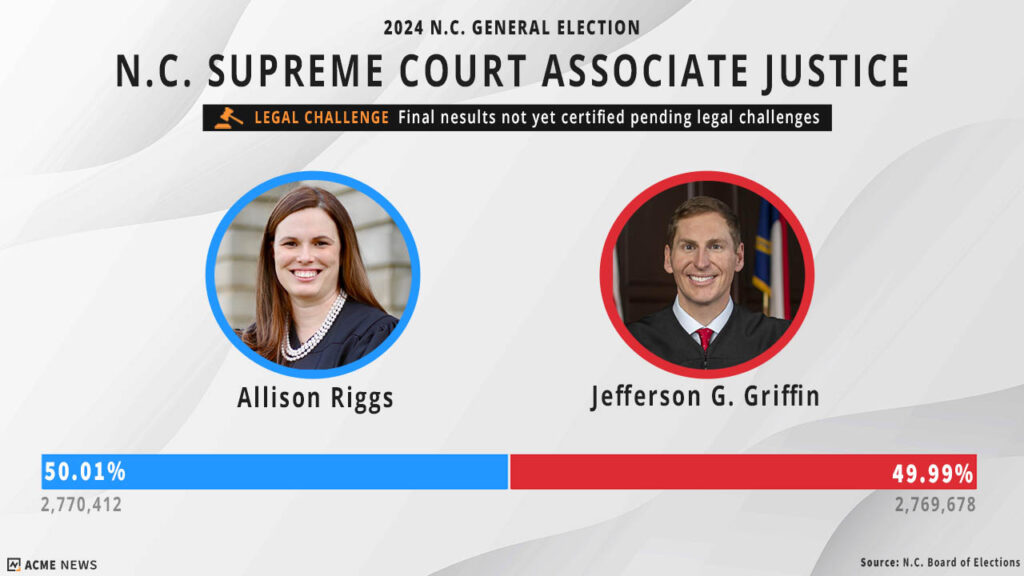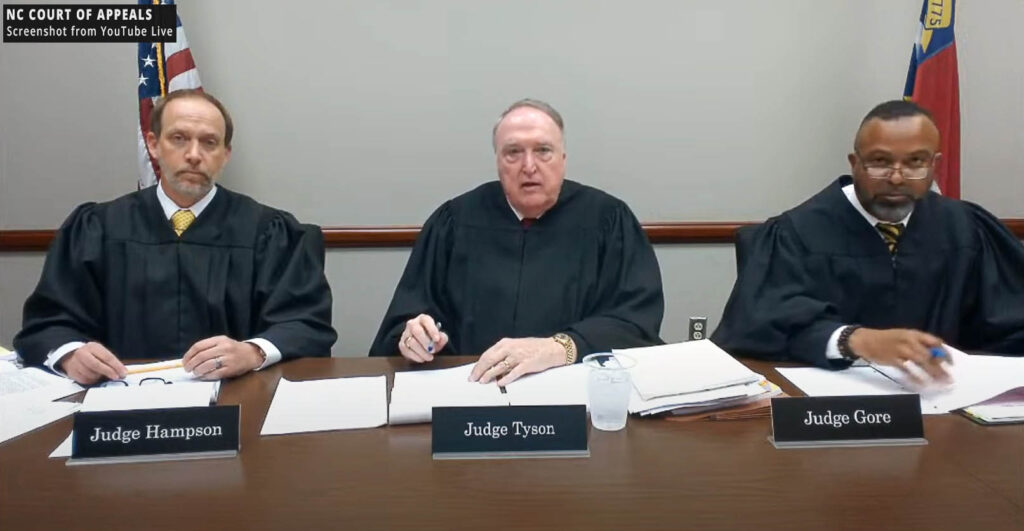UPDATE – April 8, 2025, 1 p.m.
On Monday, Justice Allison Riggs appealed the N.C. Appeals Court decision to the N.C. Supreme Court, requesting a temporary stay. The Court granted the temporary stay, halting enforcement of the appeals court’s decision, which had directed election workers to identify and contact voters whose ballots were challenged by Griffin, while the court decides if it will hear the case.

RALEIGH, N.C. (ACME NEWS) — The North Carolina Court of Appeals has issued a ruling in favor of Republican Judge Jefferson Griffin in the nation’s last unresolved race from the 2024 election for a seat on the state’s Supreme Court. The court’s decision potentially impacts the validity of tens of thousands of ballots in the closely contested election between incumbent Justice Allison Riggs, a Democrat, and challenger Judge Jefferson Griffin, a Republican, leaving voters and election officials scrambling.
Background: The Election Dispute
- November 5, 2024 – The general election is held.
- November 19, 2024 – Judge Griffin files election protests in all 100 North Carolina counties, challenging approximately 60,000 ballots. The protests cite issues such as incomplete voter registrations, lack of photo identification from overseas voters, and ballots from individuals who have never resided in North Carolina.
- December 13, 2024 – The North Carolina State Board of Elections dismisses Griffin’s protests, ruling that he failed to provide proper notice to affected voters and did not present sufficient evidence of election law violations.
- December 20, 2024 – Griffin appeals the Board’s decision, leading to further legal proceedings.
- January 7, 2025 – The North Carolina Supreme Court issues a temporary stay, halting the certification of the election results to allow for additional legal review of Griffin’s challenges.
💡 We’ve detailed Judge Griffin’s protest and the board’s findings in more detail here.
The Court’s Ruling: What Has Been Decided?
The Court of Appeals addressed the three categories of challenged ballots and ruled as follows:
- Incomplete Voter Registrations – The court ruled that ballots from voters whose registration records lacked a driver’s license number or the last four digits of a Social Security number were improperly counted. However, the court decided to allow voters affected by this issue 15 business days to provide the missing information. If the information is verified within this time frame, the ballots will be counted.
- Military and Overseas Voters Without Photo ID – The court also found that absentee ballots from military and overseas voters who did not provide photo identification or an ID exception form were invalid. Like the incomplete registrations, these voters will have 15 business days to submit the required documentation to have their votes counted.
- “Never Residents” (Voters Who Never Lived in NC) – The court ruled that ballots from overseas voters who have never resided in North Carolina are ineligible. The court ruled that these voters do not meet the state’s residency requirements, and their ballots will not be counted.
In a decision issued by the State Board of Elections following a public meeting on December 11, 2024, which addressed challenges related to the 2024 election, only 266 ballots were cast by overseas citizens who had not resided in North Carolina but whose parents or legal guardians were eligible North Carolina voters before leaving the United States.
The majority of the challenged ballots were related to incomplete voter registrations. After the election, the North Carolina Republican Party (NCGOP) hired a data analytics firm to analyze voter registration data and identify voters who cast ballots but had no driver’s license number or the last four digits of a Social Security number on file. However, it is important to note that ballots from voters who provided a valid driver’s license number or the last four digits of their Social Security number could still be challenged.
According to information provided to voters by the State Board of Elections, the voter database attempts to match the provided information with other government databases. If no match is found, the information is removed from the record. Election officials told Acme News that in such cases, the voter’s ID is verified when they arrive at the polling station.
You can read the section related to this in the Board’s statement here:
Most of the voters challenged allegedly do not have a driver’s license number or the last four digits of their social security number listed in their electronic voter registration record. There are various reasons why this may be the case. Many voters supply such a number when they register, and their county board of elections then attempts to validate that number with the DMV or the Social Security Administration. But because this effort involves attempting to match information in different government databases — using records created at different times in people’s lives — there are often mismatches in the data. When that occurs, the number is removed from the voter registration record because it failed to validate, and the voter is asked to provide an alternative form of identification when they vote for the first time.
Information for Voters Challenged in Election Protest (NC BoE)

What Does This Mean for Voters?
Voters with incomplete registrations and military/overseas voters who submitted ballots without photo ID will be notified by election officials and given 15 business days to correct their registration information or provide the necessary ID. If they fail to do so within the 15-day period, their votes could be excluded from the final tally. However, future court rulings could alter these deadlines or potentially affect the validity of the ruling, so voters should stay informed about any further legal developments.
For voters in the “Never Residents” category, under this ruling, their ballots will not be counted, as the court determined they do not meet North Carolina’s residency requirements for voting. As with the other categories, ongoing legal proceedings could impact whether or not these ballots are ultimately excluded from the count.
The Judges, the Ruling, and the Dissent
The three-judge panel that issued the ruling in the election dispute included Judge Fred Gore, a registered Republican, who ran in 2020 as part of a joint campaign with Jefferson Griffin and other GOP candidates, including now-Chief Supreme Court Justice Paul Newby. Newby played a significant role earlier this year in halting the certification of the election results to allow time for the court to consider the challenges filed by Griffin.
The ruling was also signed by Judge John Tyson, another registered Republican, who participated in the same joint campaign with Griffin in 2020.
Griffin, who serves on the North Carolina Court of Appeals, recused himself from deliberations in this case.

📺 Click to view the livestream (opens in new tab)
Judge Toby Hampson, a registered Democrat, dissented from the majority, arguing that Griffin had failed to provide evidence that any ineligible voters had cast ballots. Hampson also warned that allowing corrections after the election could undermine the integrity of the process.
“To accept [Griffin’s] indiscriminate efforts to call into doubt the votes of tens of thousands of otherwise eligible voters, without any showing that any challenged voter was disqualified under existing law from voting, is to elevate speculation and surmise over evidence and reason,” Judge Hampson wrote in his dissent.
Hampson further criticized the majority’s decision, describing the 15-day “cure period” as a form of mass voter disenfranchisement. He stated, “The majority orders the Board to allow a 15-day ‘cure period’ for the majority of challenged voters. The proposition that a significant portion of these 61,682 voters will receive notice and timely take curative measures is a fiction that does not disguise the act of mass disenfranchisement the majority’s decision represents.”
Has your ballot been challenged?
We’ve created a search tool to allow voters in N.C. to check to see if their ballot has been challenged.
Information for Voters Challenged in Election Protest
Press release from NC State Board of Elections (Updated on April 4, 2025)
Today, the North Carolina Court of Appeals issued a decision in the election protest brought by state supreme court candidate Jefferson Griffin. The court’s decision may require the county boards of elections to contact voters whose voter registration forms did not include a driver’s license number or last four digits of a Social Security number, and to allow those voters to provide that information to their county board of elections, to ensure their votes for the supreme court contest count in the 2024 general election.
The court’s decision may also require the county boards of elections to contact military and overseas-citizen voters who used absentee ballots to provide a copy of their photo identification, to ensure their votes for the supreme court contest count in the 2024 general election. This protest does not affect these voters’ selections in any other contest on the ballot.
The court’s decision is not yet in effect and is likely to be appealed. If the court’s decision does go into effect, the State Board of Elections will provide instructions to affected voters on how to comply with the court’s decision.
Regardless of the ultimate outcome of this ongoing legal dispute, any voter who is concerned that their voter registration information is incomplete or is not up to date should submit an updated voter registration form. Submitting an updated voter registration form is easy. Any voter who has a license from the DMV can go to payments.ncdot.gov to fill out a voter registration application. If you’re already registered, submitting this information will merely update your existing voter registration. You don’t need to create a special account with the DMV. You can select “Continue as Guest” on the DMV’s website and proceed directly to submitting your voter registration.
If you don’t have a license from the DMV, you can download a voter registration form at ncsbe.gov/register-mail, and then print, sign, and submit that paper form to your county board of elections. Contact and address information for the 100 county boards of elections is available here: vt.ncsbe.gov/boeinfo.
###

